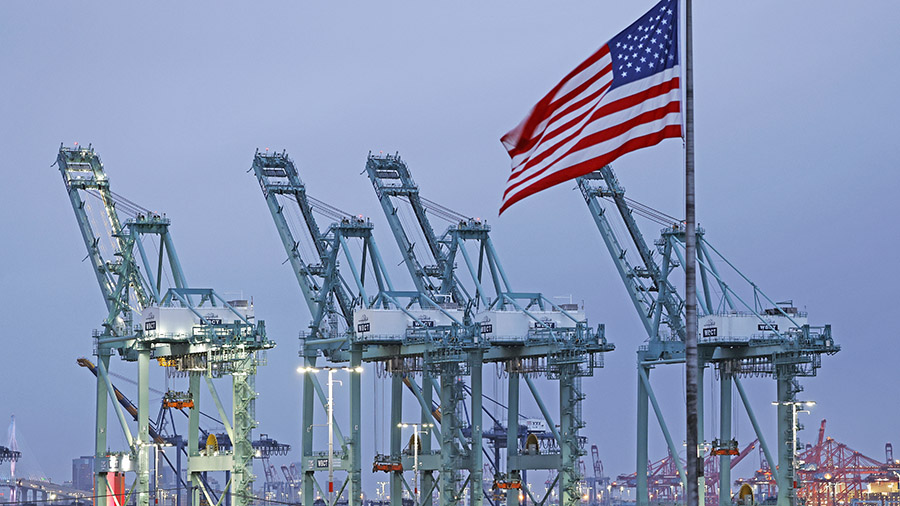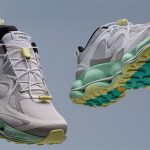At first glance, it appears that the expected slowdown in footwear shipment deliveries from Southeast Asia factories in the first month since “Liberation Day” did not materialize. Many deliveries scheduled in the sector would shrink in April after U.S. President Trump, on April 2, imposed large tariff increases on what he referred to as “Liberation Day.” The China tariffs were increased to over 145 percent during the month as the two countries played tit-for-tat with reciprocal tariffs. China increased its tariffs on U.S. products to 125 percent.
The expectations of a tough month for container deliveries in April were heightened by news reports of empty U.S. West Coast ports and estimates from the National Retail Federation (NRF) in its latest Port Tracker Report that estimated that shipping container traffic would decline for the first time since 2023. The report noted that the ports had not yet provided April data (see link at the bottom of this article for the NRF report).
The market will most likely expect to see a surge in deliveries over the next 90 days at a minimum, as the U.S. and China agreed during a meeting in Switzerland over the weekend of May 10-11, 2025, to a 90-day pause on the tariff increases each country imposed on the other. The U.S. tariffs were cut to 30 percent from 145 percent, and the China tariffs on U.S. goods were cut to 10 percent from 125 percent as the two countries work to develop a long-term deal.
The U.S. tariffs on Chinese goods still include two rounds of “fentanyl tariffs” that Trump imposed on China before the Liberation Day event. Those tariffs were also imposed on Mexico and Canada.
“In our view, this announcement is not only better than we expected but also better than the market would have expected back in March,” Deutsche Bank said in an early morning investor note.
U.S. Treasury Secretary Scott Bessent noted on CNBC Monday morning, May 12, that the U.S also had national security officials at the Geneva meetings over the weekend, and those officials had conversations with their Chinese counterparts to discuss the fentanyl issue and solutions. U.S. Trade Representative Jamieson Greer was also at the lead table with Bessent and China’s Vice Premier of the State Council, He Lifeng.
“Tariffs imposed before April 2, including those dating back to U.S. President Donald Trump’s first term, and other restrictions, such as the U.S. measures to end low-value package tariff exemptions, known as the ‘de minimis’ rule, appear to remain,” according to reporting from Reuters. This gives a lift to Amazon, which was up more than 8 percent in pre-market trading. Maintaining the elimination of the ‘de minimis’ exemption, which allows a company to avoid U.S. tariffs for shipments under $800, mostly affects direct-to-consumer e-commerce sites like Shein and Temu, which account for around 30 percent of the de minimis affected shipments, according to a recent congressional report.
“The consensus from both delegations is neither side wants to be decoupled,” Bessent said, adding that the tariffs were the equivalent of an embargo, a move neither side favored.
Now, the active lifestyle market’s brands and retailers will have their operations and finance teams working overtime this week to rebuild models and pricing plans again. Expect to see these businesses push factories to move holiday goods out the door before the end of July. As for April 2025 footwear shipments from Asia, two of the largest footwear producers in the region posted percentage growth gains versus the March 2025 trends and year-over-year volumes.
Feng Tay Enterprises
Feng Tay Enterprises, one of the longest-tenured manufacturers of Nike footwear, reported manufacturing revenues grew 2.3 percent to NT$7.27 billion in April after declining 1.5 percent to NT$7.1 billion in March.
The company’s April shipment growth at Teng Tay cycled against an 4.4 percent increase in April 2024.
Feng Tay Enterprises reports in New Taiwan Dollar (NT$) currency.
Yue Yuen Manufacturing
The company’s manufacturing business, utilized by a large portion of major outdoor and athletic brands in the U.S. and Europe, posted a 10.5 percent increase in April 2025, a sharp acceleration from a 3.5 percent increase in March.
Manufacturing was up 7.1 percent for the 2025 four-month YTD period through April.
Total net consolidated operating revenue generated in April 2025 by Yue Yuen Industrial (Holdings) Limited, including footwear manufacturing and retail stores throughout China, rose 1.2 percent year-over-year to $658.3 million, primarily due to a weak Pou Sheng China Retail business.
Pou Sheng China retail revenues fell 15.3 percent year-over-year, signaling the Chinese economy may still be weak.
The company’s net consolidated accumulative operating revenue for the 2025 year-to-date (YTD) period through April rose 1.3 percent year-over-year to $2.69 billion.
Yue Yuen, and its footwear manufacturing business, trade and report in U.S. dollar ($) currency.
Image courtesy Port of Los Angeles
***
See below for additional SGB Media coverage of the ongoing tariff and cargo shipment issues.
Import Cargo Levels Expected to See First Year-Over-Year Drop Since 2023
















